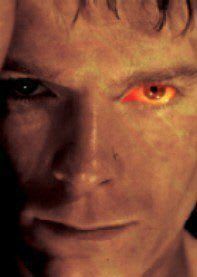Golding's novel is fifty years old this year and it was inevitable - and right - that Pilot should bring back their six year old successful stage version.
It's right because it captures the novel well, in all its bleakness and complexity. Stage versions of novels are notoriously difficult to pull off, especially for fans of the original, partially because of what has to be left out and partially because, often, the reader's imagination is more potent than anything which can be created on stage. Frequently, too, the adapter is reduced to having to insert a narrator to provide essential but non-dramatic information, and this, if not done with the utmost sensitivity, can destroy the dramatic tension of the performance.
Nigel Williams has had to do this on occasion, but he does it cleverly (and sensitively) by turning narrative into soliloquy. And he does only do it on occasion.
The opening, the plane crash, is tremendously powerful. Lighting (James Fancombe ), set (Ali Allen and Marise Rose) and soundscape (Sandy Nuttgens) combine to assault the eyes and ears of the audience, making them truly believe that they are witnessing an aircraft crashing. An excellent start, which the ensemble playing of the cast of eight maintains throughout.
This is true ensemble work, for the set (the skeletal wreckage of the plane), soundscape (effectively underscoring everything) and lighting work in close harmony with the actors. Kudos, then, to director Marcus Romer for so effectively orchestrating it all.
In some ways the story is dated, for it is hard for anyone who did not live through the fifties to imagine the constant fear - indeed, the expectation - that the world could at any moment explode into total war, which could kill off everyone. That fear that all of the adults are dead underlies the rapid descent into barbarism of Jack and his "gang". It is significant that Ralph, the only one left alive at the end to retain his civilisation, is the one who really does believe that they will be rescued.
On the other hand, the recognition that, under our veneer of civilisation, there lurks a savage is just as apposite today as it was fifty years ago.
The end of the first half was not applauded by the audience, not because they didn't like it but because they were so stunned that the collective breath was not released until after the house lights came on, by which time it was too late. There was a similar pause before enthusiastic applause at the end, signalling the audience's emotional reaction and wholehearted approval of what they had seen.
This is an extraodinarily powerful piece of theatre.
"Lord of the Flies" plays at the Gala until 19th February, before going on to Stirling, Swansea, Norway and Plymouth.
